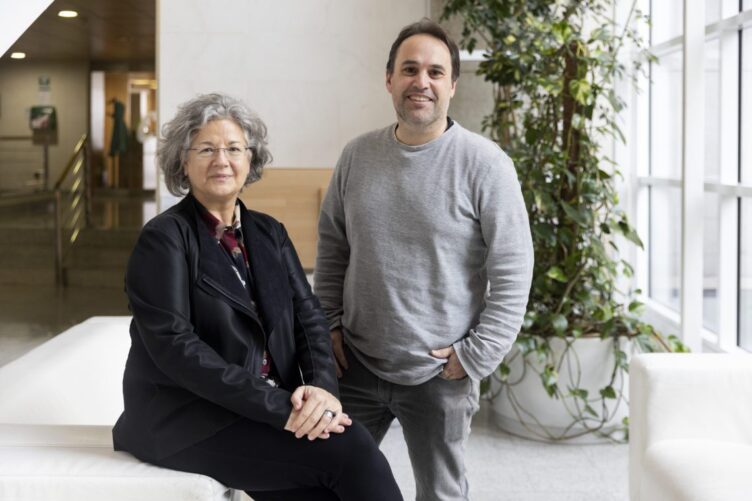This website uses cookies so that we can provide you with the best user experience possible. Cookie information is stored in your browser and performs functions such as recognising you when you return to our website and helping our team to understand which sections of the website you find most interesting and useful.
 Nuria Malats, head of the CNIO Genetic and Molecular Epidemiology Group, and Héctor Peinado, head of the CNIO Microenvironment and Metastasis Group / Laura M. Lombardía. CNIO
Nuria Malats, head of the CNIO Genetic and Molecular Epidemiology Group, and Héctor Peinado, head of the CNIO Microenvironment and Metastasis Group / Laura M. Lombardía. CNIO
Pancreatic ductal adenocarcinoma (PDAC), the most common type of pancreatic cancer, is usually diagnosed in the advanced stages. It is a tumour that remains asymptomatic for a long time, for which there are no early detection methods, and it usually causes death within one year of diagnosis. In 2020, some 8,200 cases were diagnosed in Spain (about 150,000 in the entire European Union), and the rate of incidence is increasing. Researchers agree that one of the most urgent challenges is learning to diagnose this tumour in time.
PANCAID, an acronym for Pancreatic Cancer Initial Detection via liquid biopsy, is a consortium of 17 research centres from eight countries, including Spain’s National Cancer Research Centre (CNIO). It aspires to develop a minimally invasive blood test to detect the tumour in its early stages of development.
The project, which has just been launched, will receive total funding of 9.8 million from the European Commission (EC) up to 2027. The researchers will look for biomarkers detectable in the blood that flag the presence of the tumour, such as products derived from tumour cells, even in tiny amounts.
Blood samples will be collected and analysed from patients with pancreatic cancer, precursor lesions, and people at risk (for example, patients with a genetic predisposition). Once possible biomarkers have been identified, artificial intelligence (AI) techniques will be used to determine the best ones and their combinations.
Once the best set of markers has been identified, a multi-centre clinical trial will be initiated to investigate the efficacy of the new blood test.
PANCAID “is one of the most ambitious investigations undertaken to date to improve early detection of pancreatic cancer,” says Héctor Peinado, a CNIO researcher who will analyse patient plasma to identify biomarkers secreted in extracellular vesicles (components of tumour cells that travel through the bloodstream.)
“Right now, the early detection of pancreatic cancer is a challenge. The vast majority of cases are diagnosed when it is no longer curable. Detecting it in time paves the way for early treatment,” says Peinado. “There are no screening techniques or markers in liquid biopsy that currently allow us to do this. Our goal is to advance in this field and develop a test applicable to routine practice.”
Artificial intelligence to detect pancreatic cancer
The project is so long running and involves so many researchers because “biomarkers in liquid biopsy are very difficult to identify, and also detecting them with the sensitivity necessary for an early diagnosis is a challenge”, says Nuria Malats, CNIO researcher and coordinator of one of the PANCAID groups.
Malats will coordinate data management and artificial intelligence analysis. “The objective is to identify liquid biopsy markers that predict the presence of pancreatic cancer in the early stages and to integrate them all into a single signature for use in pancreatic cancer screening programmes,” she explains. “We are going to use novel machine learning strategies and neural networks, working in collaboration with expert groups from other European countries and Israel.”
A minimally invasive blood test with high sensitivity and specificity could allow the disease to be diagnosed and treatment started earlier, reducing mortality and improving patients’ quality of life.
PANCAID is part of the Horizon Europe project and Europe’s Beating Cancer Plan. It has 17 partners from eight countries (Germany, Sweden, Spain, Austria, Belgium, France, Israel, and the United Kingdom). The project kick-off meeting took place from 13 to 15 February in Hamburg (Germany).
